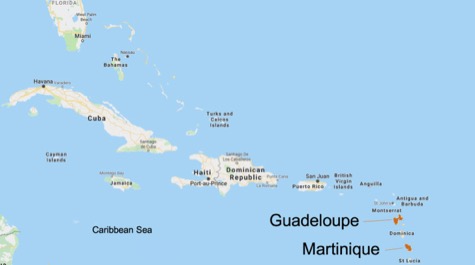Pesticide Poison in French Islands by Matt Byrnes
As of last Friday on October 25th, it's been reported that the French Caribbean islands of Guadeloupe and Martinique contains pesticide. According to Laurence Peter of BBC News, chlordecone, a pesticide linked to cancer has been sprayed on banana crops on the two islands for two decades. As of a result, all nearly all adult local residents contain traces of chlordecone inside their blood.
The French do know of this issue as their President, Emmanuel Macron called it an "environmental scandal." Macron also stated that the state "must take responsibility. In addition, the French parliament has set up a public inquiry that will report its findings this upcoming December.
On the islands, both the soil, the rivers, and the coastal waters have large tracts that are contaminated with the chlordecone. Authorities want to keep it out of the food chain, however, most produce comes from smallholders that usually sold at the roadside. A positive that can come from this is that the drinking water is safe. Carbon filters have been removing contaminants.
Chlordecone is a chlorinated chemical and an endocrine disrupter. Essentially what it does is interfere with hormones and can cause diseases. This dangerous chemical is described by the World Health Organization(WHO) as "potentially carcinogenic." When this chemical was tested inside lab mice, it caused liver tumors. Symptoms of this chemical include nervous tremors, slurred speech, short-term memory loss, and low sperm count.
The reason why the chlordecone was even used in the first place was so people could eradicate root borers, weevils that attack banana plants. Experts claim that the contamination will remain on the islands for centuries due to the fact that the chemical is very slow to break down in the environment.
The problem with this crisis is very big. Professor Luc Multigner, the head researcher at the French National Institute of Health and Medical Research called Inserm says, "The economic impact is enormous." He also said, "One-third of coastal waters are contaminated, all the rivers are - fishing is banned there. Agricultural land is 30-50% contaminated, so some cultivation has to stop."
The health impact is massive. In the article, Peters stated that a study conducted between 2013-2014, found that 95% of adults living in Martinique had chlordecone in their blood. As for Guadeloupe, it was 93%. That totals up to 750,000 people. Back in 2010, 671 Guadeloupe men were tested. The test results show that 623 of the men had prostate cancer while also having a high concentration of chlordecone in their blood.
My whole opinion on this is that the chlordecone should have never been used in the first place. The French government needs to do something and quickly. What happened is unacceptable. The people of Martinique deserve better.
Source: https://www.bbc.com/news/world-europe-50144261?intlink_from_url=https://www.bbc.com/news/topics/c302m85qenyt/france&link_location=live-reporting-story
The French do know of this issue as their President, Emmanuel Macron called it an "environmental scandal." Macron also stated that the state "must take responsibility. In addition, the French parliament has set up a public inquiry that will report its findings this upcoming December.
On the islands, both the soil, the rivers, and the coastal waters have large tracts that are contaminated with the chlordecone. Authorities want to keep it out of the food chain, however, most produce comes from smallholders that usually sold at the roadside. A positive that can come from this is that the drinking water is safe. Carbon filters have been removing contaminants.
Chlordecone is a chlorinated chemical and an endocrine disrupter. Essentially what it does is interfere with hormones and can cause diseases. This dangerous chemical is described by the World Health Organization(WHO) as "potentially carcinogenic." When this chemical was tested inside lab mice, it caused liver tumors. Symptoms of this chemical include nervous tremors, slurred speech, short-term memory loss, and low sperm count.
The reason why the chlordecone was even used in the first place was so people could eradicate root borers, weevils that attack banana plants. Experts claim that the contamination will remain on the islands for centuries due to the fact that the chemical is very slow to break down in the environment.
The problem with this crisis is very big. Professor Luc Multigner, the head researcher at the French National Institute of Health and Medical Research called Inserm says, "The economic impact is enormous." He also said, "One-third of coastal waters are contaminated, all the rivers are - fishing is banned there. Agricultural land is 30-50% contaminated, so some cultivation has to stop."
The health impact is massive. In the article, Peters stated that a study conducted between 2013-2014, found that 95% of adults living in Martinique had chlordecone in their blood. As for Guadeloupe, it was 93%. That totals up to 750,000 people. Back in 2010, 671 Guadeloupe men were tested. The test results show that 623 of the men had prostate cancer while also having a high concentration of chlordecone in their blood.
My whole opinion on this is that the chlordecone should have never been used in the first place. The French government needs to do something and quickly. What happened is unacceptable. The people of Martinique deserve better.
Source: https://www.bbc.com/news/world-europe-50144261?intlink_from_url=https://www.bbc.com/news/topics/c302m85qenyt/france&link_location=live-reporting-story
This image here shows where Guadeloupe and Martinique are located.



So scary!
ReplyDelete